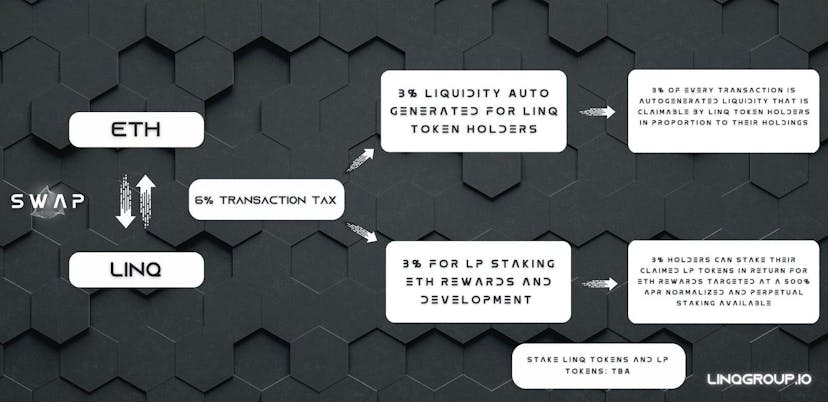Taxes On LINQ Transactions Are Used To Add Liquidity With LP Tokens Distributed To Tokenholders
While the memecoin narrative may be fading and the future of social tokens remains uncertain, new experimental token designs continue to emerge.
The LINQ token surged to a market capitalization of $38M on Aug. 28, just 17 days after going live.
LINQ collects a 6% tax on all transfers of the token. Half of the tax is used to add liquidity to a Uniswap pool for LINQ-ETH. LINQ holders are periodically able to claim those liquidity provider (LP) tokens in proportion to their holdings.

‘Decentralized Liquidity’
There are a handful of reasons to distribute LP tokens to LINQ holders, according to the project.
Founders of scam projects often remove liquidity and sell large amounts of tokens – the quintessential rug-pull – making it impossible for holders to exit the token. A wider distribution means that it’s harder for any one party to pull liquidity for LINQ.
Another reason to distribute LP tokens is that LINQ holders are less incentivized to cash out since they’re holding a revenue-generating asset, claims the project.
Creating incentive structures around a token’s liquidity isn’t a new concept. DeFi projects have long incentivized users to provide liquidity in exchange for token rewards.
OlympusDAO may not return to its former glory, but it did spur noteworthy conversion about ways for protocols to acquire their own liquidity instead of relying on fickle LPs. Now there’s LINQ, which instead of trying to acquire LP tokens for the project, is trying to distribute them through a tax system.
There are currently over 1,000 holders of LP tokens for LINQ-ETH, according to Etherscan. That means that with over 3,600 addresses holding LINQ, over a quarter of the holders are also providing liquidity. That’s a high percentage compared to most tokens which tend to only attract a small fraction of token holders to also provide liquidity. The LINQ team calls this system “decentralized liquidity.”
The remaining 3% of the transfer tax goes to the wallet that deployed the token. A module to distribute a portion to users who stake their LP tokens went live on Aug. 29.
The project is also working on a token called CLINQ which is compatible with centralized exchanges like Binance and Coinbase, according to LINQ’s documentation. Tokens which incur taxes on transfers aren’t generally compatible with exchanges.
Credit: Source link




